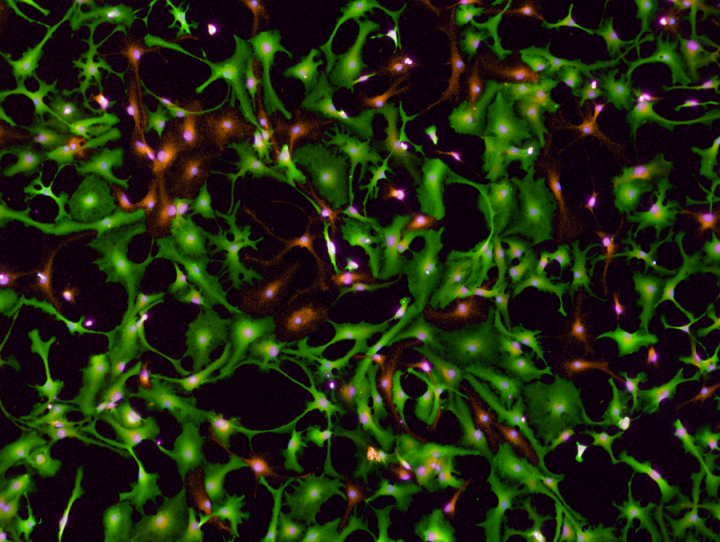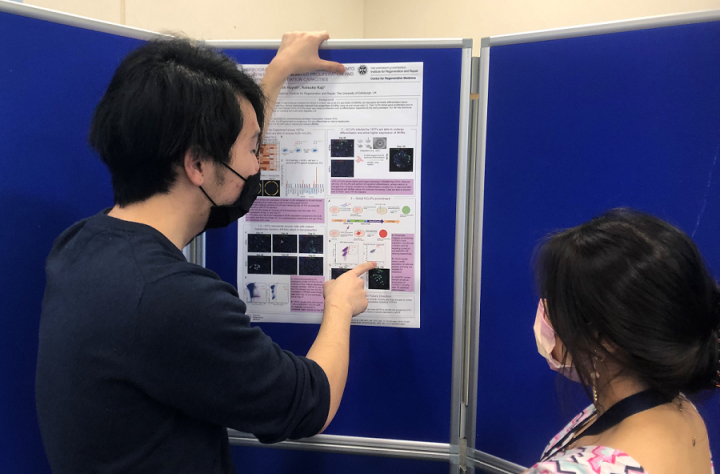Programme content
Description of programme content, credits and assessment.
MSc by Research in Regenerative Medicine and Tissue Repair programme
The programme is a one-year, full-time, on-campus MSc by Research programme which comprises two 20-week research projects and a 5-week research project proposal writing component. In addition, throughout the programme you will attend seminars, tutorials, journal clubs, discussion groups, courses and the CRM Science Retreat.
Research projects
You will undertake two research projects in different laboratories at the Institute for Regeneration and Repair (IRR), or collaborative centres. You choose your first research project from a portfolio of available projects. For your second research project you can either choose a project from a project portfolio, or approach group leaders to discuss your own idea.
During your research projects you will be supervised by supervisors who are working across disciplinary boundaries, offering you first-hand experience of working in inter-disciplinary research settings. Throughout your studies you will have access to a wide range of state-of-the-art research facilities at IRR, and the training and support provided by dedicated Facility Managers (including Imaging, Histology, Flow Cytometry and High-content Screening).

The research projects will provide you with practical experience of a wide range of current research techniques in cellular and molecular biology and genetics relevant for stem cell biology, developmental biology, inflammation research, regenerative medicine and tissue repair. The research projects will teach you good research practice, and enable you to gain analytical skills, critical appraisal and scientific writing skills.
During your research projects you will disseminate your findings through various presentation opportunities, including at lab meetings and a poster day.
After carrying out each of your research projects you write up the results as a dissertation (max 10,000 words), to be submitted for formal assessment towards your MSc by Research in Regenerative Medicine and Tissue Repair degree. Each research project bears 80 credits towards the programme total of 180 credits.
During each research project you will receive informal feedback from your supervisors. Following each research project you will receive written feedback on your laboratory performance and on your dissertation, after formal assessment.
Formal assessment of each research project comprises:
- Dissertation assessment by two independent markers (90% towards the final course mark)
- Laboratory performance assessment by your supervisor (10% towards the final course mark)
Research project proposal
Before starting your second research project around Regenerative Medicine and Tissue Repair, you will work on your chosen research project in consultation with your supervisor to design it in more detail. You will write this up as a research project proposal with detailed project plan (max 3500 words). The proposal will be written as a grant application, to be submitted in April 2020 for assessment towards your MSc by Research in Regenerative Medicine and Tissue Repair degree. The research project proposal bears 20 credits towards the programme total of 180 credits.
The research project proposal writing course provides you with practical experience of research project design and planning. The course allows you to develop your academic writing skills. By applying the format of a grant proposal, you will learn to write within the constraints that this format poses on a researcher. Importantly, the project proposal writing course permits you to take ownership of your research project from the start.
You will receive informal feedback from your supervisor and written feedback on your proposal following assessment thereof. Your written research project proposal will be formally assessed and the mark will contribute 100% to the final course mark.
Seminars, courses and student-led learning

A series of seminars and tutorials covering topics relevant to regenerative medicine and tissue repair will complement the programme, providing breadth and depth to your research projects and training. CRM runs weekly seminars by local and invited speakers, exposing you to a wide range of research topics related to regenerative medicine, stem cell biology, developmental biology and tissue repair.
In addition, you will be able to attend a range of seminar series across the University, including at the various biomedical research centres at the campus where you will be based (the Little France Campus, Edinburgh BioQuarter).
You will attend journal clubs and participate in student-led discussion groups hosted by CRM group leaders, where you will learn critical thinking skills and manuscript reviewing skills.
Throughout the programme you can attend a range of transferable skills courses, ranging from statistics to communication skills and professional development, including those offered by the University's Institute for Academic Development (IAD)
Information about the many courses and resources IAD offers postgraduate students can be found on the website below.
The University of Edinburgh's Institute for Academic Development
I am involved in a project where I feel like my contribution is important in the lab's overall progress and development and this is something I have not experienced before in my academic journey. This has a positive impact on my confidence as an aspiring research scientist.
'Even though our projects are only 20 weeks long, it's enough time to build on our research mileage and explore our interests.
'Overall, being an MScR student in this programme is allowing me to challenge my comfort zone and gain new perspectives when it comes to scientific research

